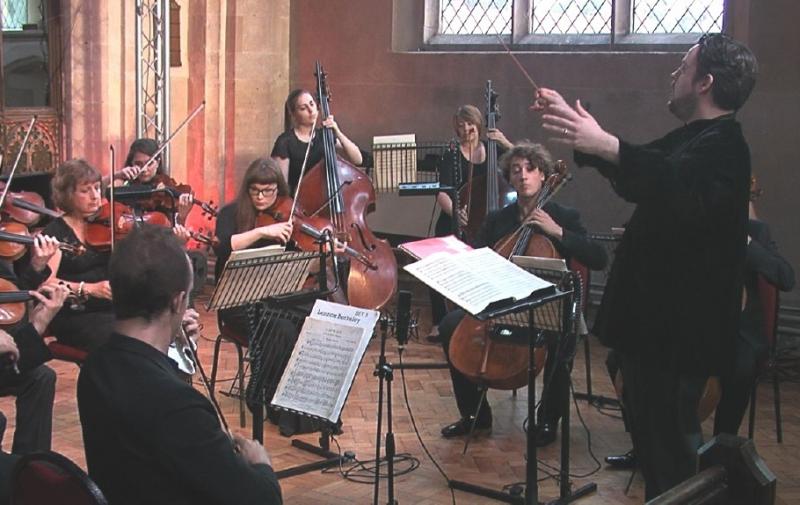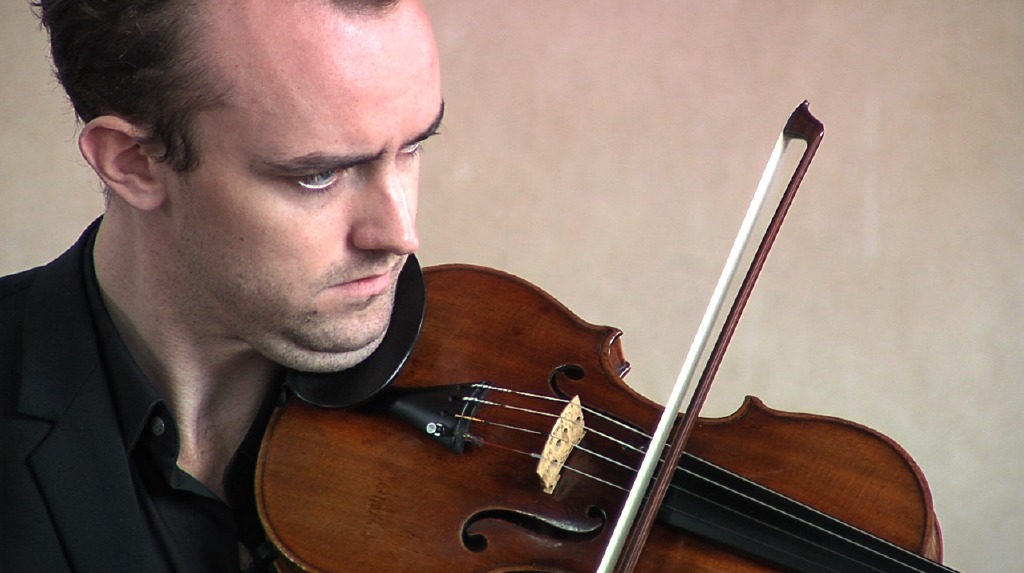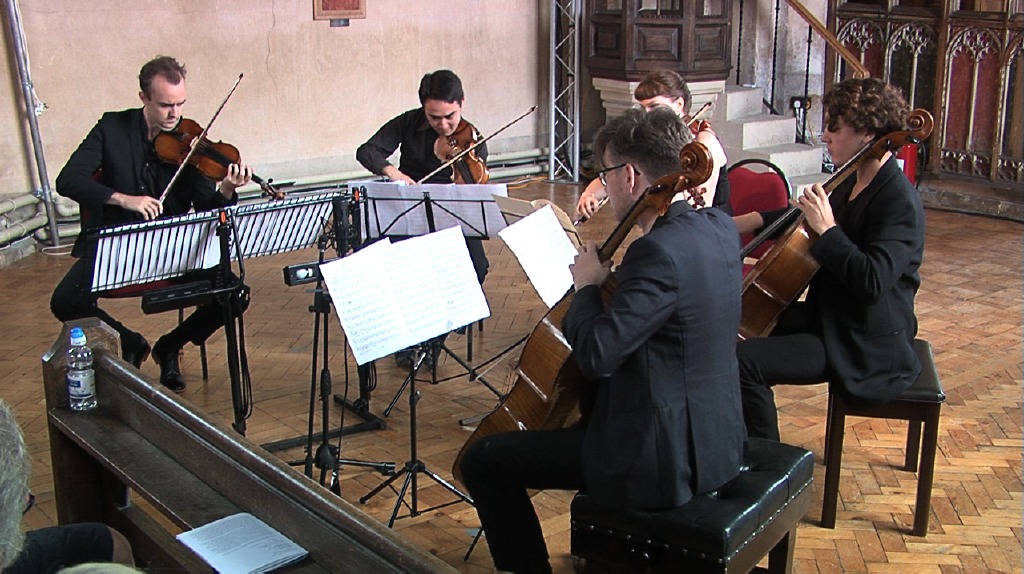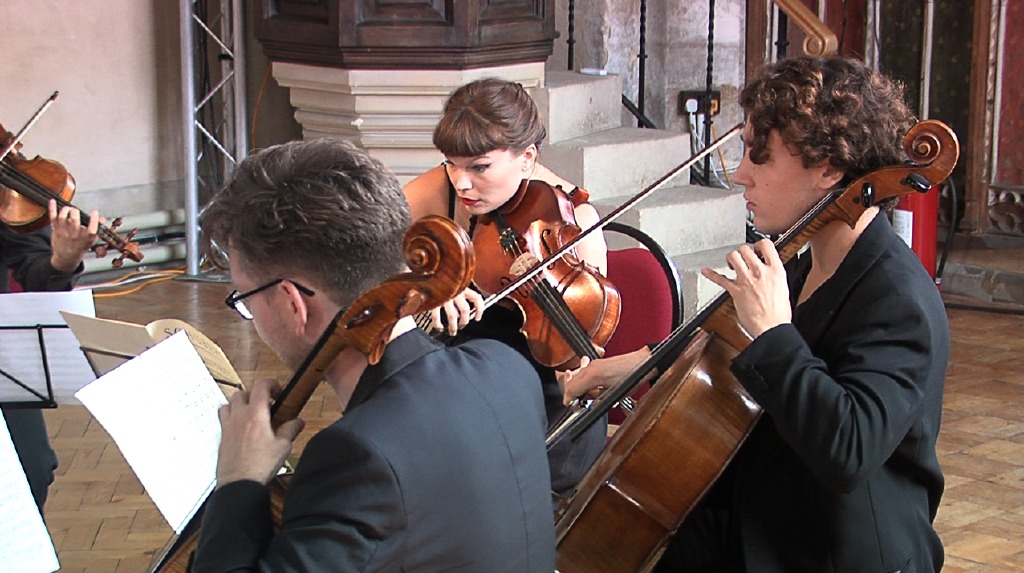Southrepps Sinfonia and Soloists, Southrepps Festival | reviews, news & interviews
Southrepps Sinfonia and Soloists, Southrepps Festival
Southrepps Sinfonia and Soloists, Southrepps Festival
Some of the world's best young string players gather in a Norfolk village

It only takes one outstanding musician with links to an out-of-the-way place to gather his or her top-notch friends and give a mini-festival of international quality. They’re springing up all over the UK: guiding lights that come to mind are violinist Anthony Marwood in Peasmarsh and tenor Toby Spence at Wardsbrook Farm.
Word of mouth connects players of equal calibre. Indeed, the way I heard about it shows how it works. I first came across Ben Baker, New Zealand-born violinist who’s just released his first CD, leading a superlative Mendelssohn Octet at the East Neuk Festival. Our next meeting was at Paavo Järvi’s Pärnu Festival, where Baker was playing in the Festival Orchestra and where his Estonian girlfriend Marike Krupp was leading the Academy Orchestra (she was also in the Southrepps Sinfonia). Baker gave an incandescent performance in Pärnu of Korngold’s piano-quartet Suite with, among others, his old Yehudi Menuhin School friend, the cellist and conductor Jonathan Bloxham. There they told me about their next engagement at Southrepps. A Schubert String Quintet with these two bracketing three other young players was bound to be something extraordinary. And it was.
 No less so was the 18-piece string orchestra led by Baker (pictured right on Sunday morning) and conducted with focus by Ben Johnson the previous evening. In the helpfully unreverberant acoustic of high-towered St James’s Church, pleasingly bare within despite the (excellent) Victorian restoration of the nave and with light flooding through the leaded Decorated-era windows, this team offered every gradation of sound from ghost-whispers to blazing unisons and multi-part splendours underpinned by the resonance of the two double-basses which you could feel behind your back in the wooden bench supports.
No less so was the 18-piece string orchestra led by Baker (pictured right on Sunday morning) and conducted with focus by Ben Johnson the previous evening. In the helpfully unreverberant acoustic of high-towered St James’s Church, pleasingly bare within despite the (excellent) Victorian restoration of the nave and with light flooding through the leaded Decorated-era windows, this team offered every gradation of sound from ghost-whispers to blazing unisons and multi-part splendours underpinned by the resonance of the two double-basses which you could feel behind your back in the wooden bench supports.
It was a carefully chosen programme of English string music with an interloper in the form of Australian-born Percy Grainger’s Handel in the Strand. That brought in the local connection, pianist Tom Primrose, to take the lead and rattle along with the rest. The pairing could have given us a real centre of gravity, or rather of light, in the form of Britten’s short but elemental Young Apollo – next year, perhaps, with Stravinsky’s Apollon musagète to complement – but there was still sufficient intensity in the young(ish) Britten’s Prelude and Fugue, darting elaborations versus a heart of darkness, and plenty of fire to the reworking of childhood inspirations in the Simple Symphony (“Playful Pizzicato", teasingly done, was bound to be the movement one came out humming).
 Warlock’s Capriol Suite made a clean, light opener, and it was surprising to hear a radiance in the opening "Vivace" of Lennox Berkeley’s Serenade for Strings, though that composer’s characteristic retreat into a paler cast of mind ended in a thoughtful but austere slow movement. The real revelation, for me at any rate, was Holst’s St Paul’s Suite, or rather its utterly individual inner movements. "Ostinato" is a true original, beautifully tapered here, and the "Intermezzo" is much more than that, with Baker soaring with typically cultured tone towards an orientally inflected cry from the collective violins’ heart: a reminder that The Planets, having struck afresh at last Monday’s Prom, wasn’t Holst’s only masterpiece. Johnson, having negotatiated some tricky tempo changes throughout with seeming effortlessness, chose an encore to leave us all dewy-eyed, Harold Darke’s Fantasia on Brother James’s Air – the first tune Johnson had been compelled to sing as a treble – with the burgeoning climax the sign of a minor master.
Warlock’s Capriol Suite made a clean, light opener, and it was surprising to hear a radiance in the opening "Vivace" of Lennox Berkeley’s Serenade for Strings, though that composer’s characteristic retreat into a paler cast of mind ended in a thoughtful but austere slow movement. The real revelation, for me at any rate, was Holst’s St Paul’s Suite, or rather its utterly individual inner movements. "Ostinato" is a true original, beautifully tapered here, and the "Intermezzo" is much more than that, with Baker soaring with typically cultured tone towards an orientally inflected cry from the collective violins’ heart: a reminder that The Planets, having struck afresh at last Monday’s Prom, wasn’t Holst’s only masterpiece. Johnson, having negotatiated some tricky tempo changes throughout with seeming effortlessness, chose an encore to leave us all dewy-eyed, Harold Darke’s Fantasia on Brother James’s Air – the first tune Johnson had been compelled to sing as a treble – with the burgeoning climax the sign of a minor master.
At 11am the next morning, with the sun streaming through the huge windows, Baker and Bloxham assembled with three other string players – violinist Ricky Gore, viola player Sarah Niblack and cellist Arthur Boutillier (pictured above) – to head for the deep and emotional waters of the Schubert Quintet. The seriousness with which they prepared for the start, silent for an opening chord which came out of nowhere, was a sign of things to come. Maybe one shouldn’t wonder at the maturity of a twentysomething group in the most profound challenge, perhaps, of the chamber repertoire; after all Schubert was still only 31, albeit harrowed by the prospect of imminent death, when he wrote the work.
 Even shorn of a first-movement exposition repeat the performance clocked in at just over an hour, though who was counting when the players gave so much space to the wistful lyricism of the first movement, charted every sensitive ache – pizzicato cello support included – and every painful, miraculous modulation in the greatest of all slow movements? You need to feel that Schubert goes beyond the human to hover on the brink of the infinite – and we did, given playing once again of supreme culture (pictured above, Bloxham, Niblack and Boutillier).
Even shorn of a first-movement exposition repeat the performance clocked in at just over an hour, though who was counting when the players gave so much space to the wistful lyricism of the first movement, charted every sensitive ache – pizzicato cello support included – and every painful, miraculous modulation in the greatest of all slow movements? You need to feel that Schubert goes beyond the human to hover on the brink of the infinite – and we did, given playing once again of supreme culture (pictured above, Bloxham, Niblack and Boutillier).
The drone bass lines of the scherzo’s outer portions again shook the church benches; the silences between deathly low chords at its heart reminded us that Schubert hasn’t finished with the profundities in his Adagio; and in the finale’s dance of death there was consolation and some astonishing gypsy ricocheting from Baker, who runs the gamut with a master’s touch. Worthy of a standing ovation from the impressively attentive audience? Of course – and when an interpretation plumbs those kind of depths, you just have to let it resonate and take note not to make the mistake of hearing another live performance of Schubert's masterpiece for quite some time.
- Southrepps Classical Music Festival website
- LadderMAN SDA website
- Ben Baker and Edward Bloxham in Egmont PIano Trio Wigmore Hall concert with guitarist Sean Shibe on 14 September; Baker in recital with Petr Limonov on 29 September
rating
Explore topics
Share this article
The future of Arts Journalism
You can stop theartsdesk.com closing!
We urgently need financing to survive. Our fundraising drive has thus far raised £33,000 but we need to reach £100,000 or we will be forced to close. Please contribute here: https://gofund.me/c3f6033d
And if you can forward this information to anyone who might assist, we’d be grateful.

Subscribe to theartsdesk.com
Thank you for continuing to read our work on theartsdesk.com. For unlimited access to every article in its entirety, including our archive of more than 15,000 pieces, we're asking for £5 per month or £40 per year. We feel it's a very good deal, and hope you do too.
To take a subscription now simply click here.
And if you're looking for that extra gift for a friend or family member, why not treat them to a theartsdesk.com gift subscription?
more Classical music
 Frang, LPO, Jurowski, RFH review - every beauty revealed
Schumann rarity equals Beethoven and Schubert in perfectly executed programme
Frang, LPO, Jurowski, RFH review - every beauty revealed
Schumann rarity equals Beethoven and Schubert in perfectly executed programme
 Levit, Sternath, Wigmore Hall review - pushing the boundaries in Prokofiev and Shostakovich
Master pianist shines the spotlight on star protégé in another unique programme
Levit, Sternath, Wigmore Hall review - pushing the boundaries in Prokofiev and Shostakovich
Master pianist shines the spotlight on star protégé in another unique programme
 Classical CDs: Big bands, beasts and birdcalls
Italian songs, Viennese chamber music and an enterprising guitar quartet
Classical CDs: Big bands, beasts and birdcalls
Italian songs, Viennese chamber music and an enterprising guitar quartet
 Connolly, BBC Philharmonic, Paterson, Bridgewater Hall, Manchester review - a journey through French splendours
Magic in lesser-known works of Duruflé and Chausson
Connolly, BBC Philharmonic, Paterson, Bridgewater Hall, Manchester review - a journey through French splendours
Magic in lesser-known works of Duruflé and Chausson
 Biss, National Symphony Orchestra, Kuokman, NCH Dublin review - full house goes wild for vivid epics
Passionate and precise playing of Brahms and Berlioz under a dancing master
Biss, National Symphony Orchestra, Kuokman, NCH Dublin review - full house goes wild for vivid epics
Passionate and precise playing of Brahms and Berlioz under a dancing master
 Verdi Requiem, Philharmonia, Muti, RFH review - new sparks from an old flame
Discoveries on a veteran maestro's epic journey
Verdi Requiem, Philharmonia, Muti, RFH review - new sparks from an old flame
Discoveries on a veteran maestro's epic journey
 Batsashvili, Hallé, Wong, Bridgewater Hall, Manchester review - a star in the piano universe
The Georgian pianist brings precision and freedom to Liszt’s warhorses
Batsashvili, Hallé, Wong, Bridgewater Hall, Manchester review - a star in the piano universe
The Georgian pianist brings precision and freedom to Liszt’s warhorses
 Naumov, SCO, Egarr, Queen's Hall, Edinburgh review - orchestral magic rescues some punishing music
Hard-driven Beethoven, monotonous Eötvös, some light from Kernis
Naumov, SCO, Egarr, Queen's Hall, Edinburgh review - orchestral magic rescues some punishing music
Hard-driven Beethoven, monotonous Eötvös, some light from Kernis
 Classical CDs: Shipping lines, sabre dances and sea lice
Neglected piano concertos, Italian art songs and new music for trombones
Classical CDs: Shipping lines, sabre dances and sea lice
Neglected piano concertos, Italian art songs and new music for trombones
 Il trionfo del Tempo e del Disinganno, Irish Baroque Orchestra, Whelan, St George’s Hanover Square review - Handel’s journey of a soul
Pleasure gets the best deal despite Beauty’s struggle to higher things
Il trionfo del Tempo e del Disinganno, Irish Baroque Orchestra, Whelan, St George’s Hanover Square review - Handel’s journey of a soul
Pleasure gets the best deal despite Beauty’s struggle to higher things
 Uproar, Rafferty, Royal Welsh College, Cardiff review - colourful new inventions inspired by Ligeti
Unfussy professionalism from Wales-based new music ensemble
Uproar, Rafferty, Royal Welsh College, Cardiff review - colourful new inventions inspired by Ligeti
Unfussy professionalism from Wales-based new music ensemble

Add comment